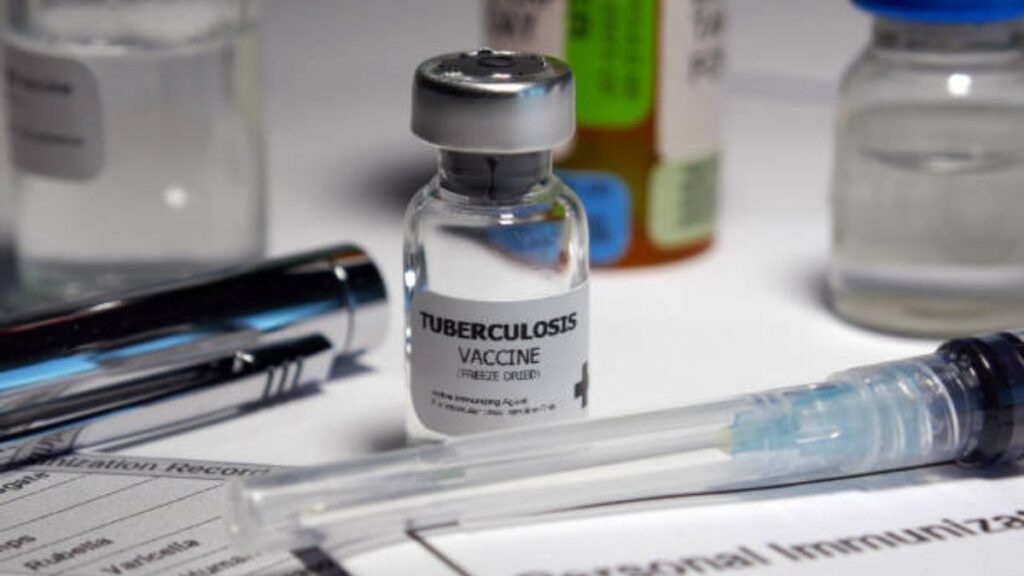Introduction:-
Why BCG Doses in Adult Tuberculosis Defense
In the battle against tuberculosis (TB), one of the most potent weapons in our arsenal is the BCG vaccine. While often associated with childhood immunization programs, its significance extends far beyond early years. For adults, the BCG dose stands as a formidable shield against the threat of tuberculosis, offering crucial protection in the fight against this infectious disease.
Understanding the BCG Doses (Vaccine)

BCG, which stands for Bacillus Calmette-Guérin, is a vaccine derived from a weakened strain of Mycobacterium bovis, a bacteria related to the one that causes tuberculosis in humans, Mycobacterium tuberculosis. Administered via a single injection, BCG vaccination stimulates the body’s immune response, priming it to recognize and combat TB bacteria more effectively.
Importance for Adults
While childhood vaccination programs have long been recognized for their role in preventing severe forms of TB in children, the significance of BCG doses for adults cannot be overstated. Adults, especially those residing in regions with high TB prevalence or those at increased risk due to factors such as occupation or travel, greatly benefit from BCG vaccination.
Enhanced Immunity
BCG vaccination not only helps prevent active TB disease but also enhances the body’s immune response against latent TB infection (LTBI). LTBI occurs when individuals harbor TB bacteria without exhibiting symptoms of active disease. By bolstering the immune system’s ability to control latent infection, BCG vaccination reduces the risk of LTBI progressing to active TB, thereby preventing transmission within communities.
Effectiveness and Longevity
Studies have demonstrated the effectiveness of BCG vaccination in reducing the risk of TB disease in both children and adults. While the level of protection may vary across populations and regions, BCG vaccination has consistently shown to be a valuable tool in TB prevention efforts. Moreover, the protective effects of BCG can endure for many years, offering sustained immunity against TB throughout adulthood.
Incorporating BCG into Adult Immunization Strategies
Given its significant impact on TB prevention, integrating BCG vaccination into adult immunization strategies is essential. Health authorities worldwide recognize the importance of expanding BCG coverage beyond infancy to encompass broader age groups, especially in populations with heightened TB risk. By ensuring access to BCG vaccination for adults, healthcare systems can fortify their defenses against TB transmission and reduce the burden of disease within communities.
What are the key factors influencing the decision to administer BCG doses for adult tuberculosis defense in different regions or populations?
The decision to administer BCG doses for adult tuberculosis defense varies depending on several key factors, which include:
- Tuberculosis Burden: Regions with high tuberculosis prevalence often prioritize BCG vaccination for both children and adults due to the elevated risk of exposure to TB bacteria.
- Epidemiological Trends: Understanding the local epidemiological patterns of tuberculosis, including transmission dynamics and risk factors, informs decisions regarding BCG vaccination strategies for adults.
- Healthcare Infrastructure: The availability and accessibility of healthcare services, including vaccination programs and trained healthcare personnel, play a crucial role in determining the feasibility of administering BCG doses to adults.
- Resource Allocation: Limited resources may necessitate prioritization of BCG vaccination for specific adult populations deemed at higher risk of tuberculosis, such as healthcare workers, individuals living with HIV/AIDS, or those in close contact with TB patients.
- Vaccine Supply and Logistics: The availability of BCG vaccine doses, along with the capacity for storage, distribution, and administration, influences the implementation of adult BCG vaccination programs in different regions.
- Policy Guidelines: National or regional vaccination policies and guidelines, which may be influenced by recommendations from public health authorities such as the World Health Organization (WHO), guide the decision-making process regarding BCG vaccination for adults.
- Immigration and Travel: In regions with significant immigration or travel-related tuberculosis transmission, consideration may be given to administering BCG doses to adults who have migrated from or traveled to high-prevalence areas.
- Occupational Exposure: Certain occupations, such as healthcare, corrections, or social services, may entail a higher risk of TB exposure, leading to targeted BCG vaccination programs for adult workers in these sectors.
- Demographic Characteristics: Factors such as age, socioeconomic status, and underlying health conditions may influence the risk of tuberculosis and the likelihood of benefiting from BCG vaccination among adult populations.
- Public Health Priorities: The broader public health goals and objectives of tuberculosis control programs, including reducing TB incidence, prevalence, and transmission, guide decisions regarding the role of BCG vaccination in adult tuberculosis defense within specific regions or populations.
By considering these factors in a comprehensive manner, healthcare authorities and policymakers can tailor BCG vaccination strategies to effectively mitigate the burden of tuberculosis among adults in diverse settings.
Can BCG vaccination in adulthood provide sufficient protection against tuberculosis for individuals with prior exposure to the disease?
BCG vaccination in adulthood can offer some level of protection against tuberculosis (TB), even for individuals with prior exposure to the disease. However, the degree of protection may vary depending on several factors:

- Timing of Vaccination: BCG vaccination is most effective when administered before exposure to TB bacteria. In individuals vaccinated during adulthood after prior exposure, the vaccine may still provide some degree of protection against TB disease, but it might be less robust compared to those vaccinated before exposure.
- Immune Response: The effectiveness of BCG vaccination in individuals with prior exposure to TB can be influenced by the individual’s immune response. Factors such as overall health, immunocompetence, and genetic predisposition can impact how the body reacts to the vaccine and its ability to provide protection against TB.
- Degree of Prior Exposure: The intensity and duration of prior exposure to TB bacteria can affect the outcome of BCG vaccination. Individuals with limited or low-level exposure may derive greater benefit from BCG vaccination in adulthood compared to those with prolonged or intense exposure.
- Strain Variability: BCG vaccines are derived from different strains of Mycobacterium bovis, and the efficacy of each strain may vary. Some strains may confer better protection against TB disease, while others may offer limited or inconsistent protection, especially in individuals with prior exposure.
- Latent TB Infection (LTBI): In individuals with prior exposure to TB who have developed latent TB infection (LTBI), BCG vaccination may help prevent the progression from latent infection to active TB disease. While BCG is not typically recommended for individuals with confirmed LTBI, it may still provide some level of additional protection against TB reactivation.
- Comprehensive TB Control Measures: BCG vaccination is just one component of comprehensive TB control strategies. In conjunction with other measures such as early detection, diagnosis, treatment of active TB cases, and infection control measures, BCG vaccination can contribute to reducing the overall burden of TB in populations with prior exposure to the disease.
What advancements or innovations are being explored to enhance the efficacy of BCG doses in adult tuberculosis defense?
Advancements and innovations are continuously being explored to enhance the efficacy of BCG doses in adult tuberculosis defense. Some of the key areas of research and development include:
- Novel Vaccine Formulations: Researchers are investigating new formulations of the BCG vaccine to improve its immunogenicity and efficacy in adults. This includes modifications to the vaccine’s composition, delivery methods (such as aerosol or needle-free delivery), and adjuvants to enhance the immune response and provide longer-lasting protection against tuberculosis.
- Prime-Boost Strategies: Prime-boost vaccination approaches involve priming the immune system with one vaccine (such as BCG) followed by boosting with another vaccine or immunogen. Studies are exploring the potential of combining BCG vaccination with novel TB vaccine candidates or immunomodulators as booster doses to enhance protective immunity against tuberculosis in adults.
- Genetic Modification of BCG: Genetic engineering techniques are being used to modify the BCG vaccine strain to enhance its immunogenicity and efficacy. This includes deleting or modifying specific genes in the BCG genome to optimize its ability to stimulate protective immune responses against tuberculosis in adult populations.
- Adjuvant Development: Adjuvants are substances added to vaccines to enhance the immune response. Researchers are developing new adjuvants or adjuvant formulations to be used in combination with BCG vaccination in adults. These adjuvants aim to enhance the magnitude, duration, and quality of the immune response elicited by BCG, thereby improving its effectiveness in tuberculosis defense.
- Immune Modulators: Immunomodulatory agents, such as cytokines, toll-like receptor agonists, and immune checkpoint inhibitors, are being investigated as potential adjuncts to BCG vaccination in adults. These agents can modulate the immune response to BCG, promoting a more robust and durable protective immunity against tuberculosis.
- Therapeutic Vaccination Strategies: Therapeutic vaccination approaches aim to boost the immune response in individuals already infected with Mycobacterium tuberculosis, including those with latent TB infection (LTBI). Researchers are exploring the use of BCG revaccination or novel BCG-based vaccines as therapeutic interventions to prevent TB reactivation and progression to active disease in adults with LTBI.
- Systems Biology Approaches: Systems biology techniques, such as transcriptomics, proteomics, and metabolomics, are being employed to elucidate the complex immune mechanisms underlying BCG vaccination and tuberculosis protection in adults. These approaches help identify biomarkers of vaccine-induced immunity and uncover novel pathways for enhancing the efficacy of BCG doses in tuberculosis defense.
Conclusion
The BCG dose stands as a vital shield against tuberculosis for adults, providing crucial protection against active TB disease and latent infection. Its ability to enhance immunity and offer long-term benefits underscores the importance of integrating BCG vaccination into adult immunization programs. By harnessing the preventive power of BCG, we can advance our efforts in combating tuberculosis and move closer to a world free from this infectious threat.
This article aims to provide informative content while incorporating relevant keywords for search engine optimization (SEO), such as “BCG dose,” “tuberculosis prevention,” and “adult immunization.”






